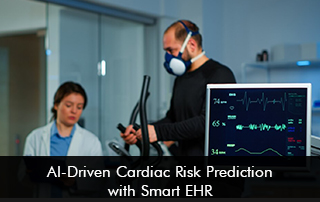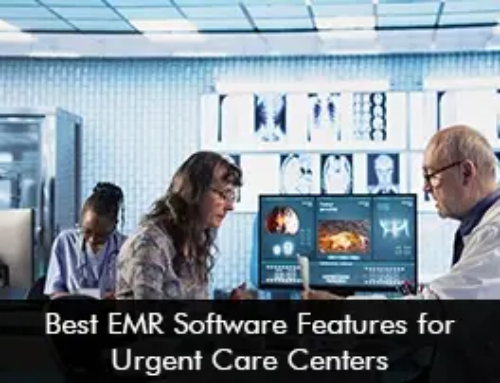AI-driven cardiac risk prediction integrated into smart EHR systems transforms how cardiovascular diseases are managed. By leveraging advanced analytics and real-time monitoring, these technologies enhance early detection, improve patient outcomes, and streamline healthcare workflows. Physicians and hospitals in the United States increasingly rely on top-tier EHR solutions like Epic Systems, Cerner, and others to stay at the forefront of cardiac care.
The Critical Role of EMR in Cardiology
Electronic Medical Records (EMRs), often interchangeably referred to as Electronic Health Records (EHRs), have revolutionized healthcare delivery, particularly in cardiology. With cardiovascular diseases being the leading cause of death globally, EMR systems play a pivotal role in patient care. They enable efficient data management, personalized treatment plans, and now, with advancements in Artificial Intelligence (AI), predictive analytics for cardiac risk.
AI-powered EMRs can assess vast amounts of patient data, including lab results, imaging reports, and historical health records, to identify individuals at risk of heart disease. This proactive approach allows physicians to intervene early, ultimately saving lives and reducing healthcare costs. In today’s tech-driven healthcare landscape, integrating AI with EMRs for cardiac care is not just beneficial—it’s essential.
How AI-Driven EMR Enhances Cardiac Risk Prediction
-
Comprehensive Data Analysis
- AI-driven EMRs analyze structured and unstructured data from multiple sources, including medical history, lifestyle factors, and genetic information.
- They identify patterns that may indicate early signs of cardiovascular risk, enabling timely preventive measures.
- Machine learning algorithms ensure continuous improvement in predictive accuracy.
-
Personalized Risk Assessments
- AI models in EHR systems assess patient-specific risk factors like cholesterol levels, blood pressure, and lifestyle habits.
- They provide personalized risk scores, guiding clinicians in tailoring treatment plans.
-
Real-Time Monitoring and Alerts
- AI-powered EMRs integrate with wearable devices to monitor vital signs in real-time, such as heart rate and blood pressure.
- Automated alerts notify physicians of abnormal readings, facilitating swift interventions.
-
Enhanced Decision Support
- AI tools assist in clinical decision-making by suggesting evidence-based treatment options for high-risk patients.
- They reduce diagnostic errors and improve overall care outcomes.
-
Population Health Management
- On a larger scale, AI-driven EHRs analyze population-level data to identify trends and high-risk demographics.
- This helps public health organizations develop targeted prevention strategies.
Benefits of AI-Driven Cardiac Risk Prediction in EHR
-
Early Detection:
Predictive analytics can identify risks before symptoms appear, allowing preventive interventions.
-
Improved Patient Outcomes:
Proactive care leads to reduced hospitalizations and better quality of life for patients.
-
Cost Efficiency:
Preventing cardiac events lowers healthcare costs significantly.
-
Streamlined Workflow:
Automated processes save time for healthcare providers, enabling them to focus on patient care.
-
Data-Driven Insights:
AI provides actionable insights, ensuring data is utilized effectively.
Top 5 EMR Software for Cardiac Risk Prediction
-
Epic Systems
Epic Systems is a market leader in EHR solutions, widely adopted in the United States.
- Offers robust AI integration for cardiac risk prediction using patient data.
- Includes comprehensive tools for data analysis, real-time monitoring, and population health management.
- Features user-friendly dashboards and seamless interoperability with other systems.
- Epic’s scalability makes it suitable for both small practices and large hospital networks.
-
Cerner
Cerner is renowned for its advanced AI capabilities and data-driven insights.
- Provides predictive analytics for identifying cardiovascular risks.
- Integrates with wearable devices for real-time patient monitoring.
- Offers customizable modules tailored for cardiology departments.
- Supports interoperability through its HealtheIntent platform, enhancing data sharing across systems.
-
Allscripts
Allscripts focuses on precision medicine through innovative EHR solutions.
- Utilizes AI to generate personalized risk assessments and treatment plans.
- Features robust telehealth integration for remote monitoring of cardiac patients.
- Provides intuitive interfaces for seamless clinician-patient interaction.
- Ensures compliance with regulatory standards, ensuring data security and reliability.
-
NextGen Healthcare
NextGen Healthcare is highly regarded for its specialty-focused EHR capabilities.
- Offers tailored solutions for cardiology, including risk prediction algorithms.
- Enhances workflow efficiency with voice recognition and AI-driven documentation.
- Includes population health tools to manage cardiovascular risks on a larger scale.
- Features integrated analytics for actionable insights and performance tracking.
-
Athenahealth
Athenahealth stands out for its cloud-based EHR platform, which supports AI integration.
- Provides advanced analytics for early detection of heart disease.
- Features real-time monitoring and personalized care coordination tools.
- Focuses on user-friendly interfaces for improved clinician productivity.
- Ensures seamless data sharing across healthcare providers through its interoperability features.
Investing in cutting-edge EMR systems is not just a step forward for healthcare providers—it’s a commitment to better patient health outcomes and a smarter, data-driven future.








